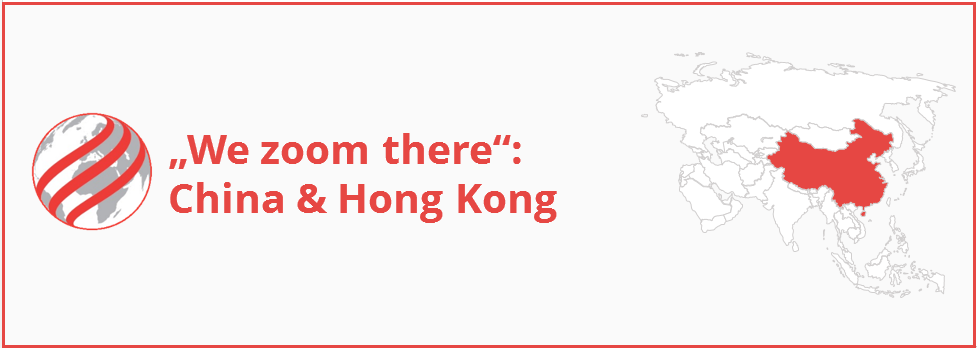The West and China & Hong Kong – tensions and an open future
June 22, 2020
The focus of our video conference on June 22 was China and the West. It was an exciting discussion between two experts in this field: Wolfgang Niedermark, representative of the German industry and Chairman of the German Chamber of Commerce in Hong Kong, and Dr. Hubert Lienhard, former Chairman of the Asia-Pacific Committee of German Industry and CEO of Voith GmbH & Co. KGaA. Quickly, it became clear that Europe will play a major role in this discussion. According to the panelists, Europe has to find its own independent role in the decoupling process between the two world powers USA and China, and Germany would have to play a central role in this process. In these difficult times, Germany had the responsibility to strengthen rather than weaken transatlantic relations. The informative and lively discussion ended with a committed plea for a strong Europe. Dr. Beate Lindemann introduced and moderated the discussion.
Hong Kong – “one country two systems”
The renewed protests in Hong Kong had shown that the city was still a central point of friction between Communist-ruled China and the West, which is based on liberal democratic values, said Wolfgang Niedermark. He started with a “look from the inside”. Sitting in front of a panorama window, he pointed to the Hong Kong skyline to show “that Hong Kong is not on fire”. Although Mainland China was further expanding its rights of intervention in Hong Kong through the Security Law, the “one country two systems” model was still resilient in many areas. However, the population would perceive that act as a “violation of previous agreements”. With regard to German companies in Hong Kong, Niedermark does not see any short-term restrictions on business activities due to the ongoing “mainlandisation process”, which in the long term, however, would lead to self-censorship and displace the liberal character of Hong Kong.
The West and China
That the West, including the USA, and China do not maintain a harmonious relationship has already been demonstrated by the protracted trade dispute and the mutual expulsion of journalists several months ago. At that time, responsibility for the deterioration of relations was often attributed to the US administration of President Donald Trump, but this was not entirely correct, said Dr. Hubert Lienhard: The dispute between the USA and China was not a Trump issue, but rather the concern, widespread in both legislative houses, that the American world power was losing its position.
Dr. Lienhard pointed out that there was nevertheless a great danger in the escalation of bilateral relations, namely that Europe would have to decide which side it wants to stand on. China had implemented the principle of “divide and rule” very well with the Belt and Road Initiative and had already brought a number of EU states, including Italy, on board. In order to prevent such actions, which would certainly divide the EU, in the future, Dr. Lienhard said, it was of highest importance for Germany to actively seek European solutions. In this way, Germany could contribute to strengthening Europe’s role in world politics.
Our world is not becoming more and more global
A process that makes the role of a strong Europe all the more important is the so-called decoupling, which Wolfgang Niedermark described as “the opposite of globalization”. Decoupling could be divided into a passive and an active part. “Active”, he said, includes American measures such as tariffs and investment restrictions, the termination of research cooperation and threats to trading partners. In contrast, he said, China is “passively” evading the globalization processes (for example, Niedermark cited the more difficult market access for foreign companies, an Internet that is censored and strongly national and has the character of an intranet, and the fact that China does not feel bound by international product standards) and is making less effort than before to integrate itself more strongly into globalized systems.
Dr. Lienhard underlined Wolfgang Niedermark’s statements by describing the often quoted motto “Trade creates change” as not being true for China. From his point of view, it is clear that China is consistently implementing its system of a state-controlled market economy. The negative image of the US in Europe also does not help to improve US-European relations, Dr. Lienhard explained, adding that the worst thing that could happen is that the US demands that Europe should choose sides.
Last resort: strong Europe
In a convincing plea for a strong Europe, Dr. Lienhard drew his conclusion: It is in Europe’s hands to shape its own future. The positions of China and the USA were firmly anchored in both systems. They need a balance in the form of a “third alternative”, such as Europe. The prerequisite for a strong Europe is a “strong leader” who enjoys broad support and pursues two things above all: Firstly, close European cooperation at military level and secondly, a common European economic policy. At present, economic policy is nationally oriented and includes antitrust law, which tries to obtain the best price for customers by encouraging a high amount of suppliers. As a result, company mergers, such as that of Siemens and Alstom, could not be realized, so that large and globally competitive infrastructures could not even come into existence. In his view, the EU must move away from “buzzwords for the future and towards concrete measures for the present”.
In conclusion, Wolfang Niedermark reminded the audience that despite all systemic competition, China is an established trading partner whose markets offer great opportunities and which is needed to effectively address global challenges such as climate protection, the fight against the causes of mass migration or international security. In addition, Europe must also pay more attention to remote regions in Eastern Europe in order not to leave the field entirely to China. This in turn would only be possible for the EU from a position of strength.

